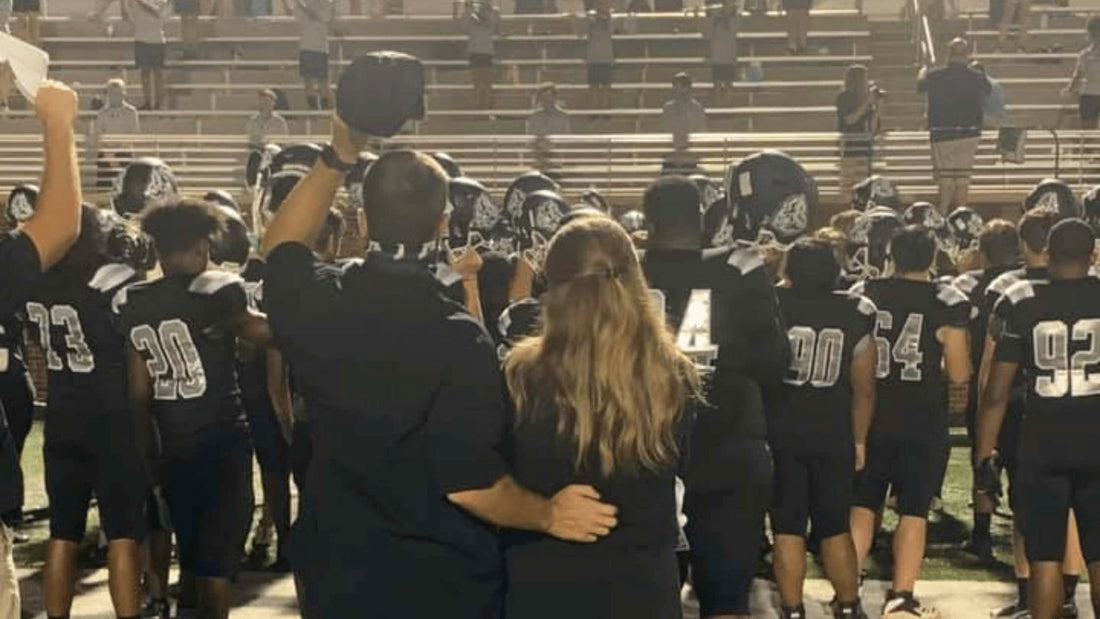As the wife of a coach in a small town, the kinda-famous-by-proxy element feels complicated sometimes. I’m a little bit of a girl-power type of gal—I value autonomy and want to be valued for who I am.
Another complicated element is the accidental leadership bit. By nature of their jobs, small-town coaches are more visible than most school administrators, community officials, and possibly even local clergy.
By nature of our relationships, that puts the family members of these coaches on quasi-display as well. Whether or not it feels fair, that means that our words, actions, and decisions are rarely completely private.
What does this kinda-famous-by-proxy leadership mean during a pandemic…in an election year…in a time when civil rights and racial injustices are major societal players as well? Oh, and the hardships and heartaches unique to each community in typical circumstances—those haven’t gone away either.
We’re frustrated about masks and school and viruses and job security and how they heck am I supposed to get ball game tickets this week and the economy and social media behavior and childcare and and and…what do we do?
You and I—the wives of guys who love sports and love kids and have somehow catapulted us into places of accidental leadership. What do we do?
It’s simple…just be more like Jesus.
Hahahahahahahahahaha
I laugh because whether you believe Jesus is the Son of God or just a really rad teacher, the standard is impossibly high. Simple, but impossible. But if there’s anything a life adjacent to competition has taught us, it’s that clear eyes, full heart, can’t lose—right?
Well, probably not. Most of us have seen a heroically beautiful team lose. So let’s have a better plan than just strapping on a brave face and marching forward.
Let’s look at it—what did Jesus do?
1. He loved the unexpected.
From the contagiously deceased to the politically corrupt, Jesus made eye contact with everybody. He showed the value he saw in every image bearer—no matter how annoying or crude or unhygienic or gossipy or polarizing they might have been—by having conversations rather than cursory greetings, by accepting invitations for dinner, and by asking hard questions.
Now, he did not keep forty hundred best friends. We know he had a very small inner circle. What he did do was take the time to genuinely engage with folks who made even his best friends primly raise their fisherman eyebrows.
This is an uncomfortable proposition, but it’s also a pungent testimony of grace. I have a savior who loves me even though I am annoying and I gossip and I certainly smell iffy fairly often, so how can I, in good conscience, refuse the humble offering of a few moments of my attention to someone who exists outside my comfort zone?
2. He considered the least.
The language of this one trips me up sometimes—like there are some folks who are more valuable, and some less? Noooonono. That’s not it. Rather, we’re talking about the least privileged. The least powerful. The most vulnerable.
When our whole school, K-12, gets together once a year for a giant pep rally, everyone has to sit still and wait for the Kinder kiddos to exit at the end—not because their little souls are more valuable than anyone else's, but because they’re vulnerable little cutie pies who are complete flight risks. That’s pretty easy to concede, right?
The thing is, identifying the vulnerable among us is rarely so simple. We’ve got to take our assumptions and turn them on their heads. Instead of assuming that our best intentions will get us by and we’re probably on the same page as the folks around us, we’ve got to go the other direction. Assume our friends have trauma we don’t know about. Assume every kid has a high-risk person in their household. Assume I could be perceived as a threat, even if I truly don’t think I am.
Does that mean I need to ceaselessly bend to the whims of the people around me? Absolutely not. Is it often a simple sacrifice (but a sacrifice nonetheless) to be a little more considerate of other people? Absolutely yes. Which brings us to the final point—
3. He sacrificed.
It’s easy-ish to sacrifice when the payout is obvious. When a virus is proven to be present, or racism is blatant, we know what to do to show love. When expectations are clear, we can be respectful and follow them. But when circumstances are more vague—as they almost always are—it’s hard to stick to our convictions and publicly follow through on the decisions we made privately. It costs something—physical comfort, social ease, peace of mind.
But Jesus did it. And he did it in front of and for the folks who mocked him, and he didn’t have a zinger of a meme to repost on facebook about it, either.
It’s a little hard sometimes to accept a position I didn’t apply for—but when I take a position and make it my own work, I find my autonomy hasn’t gone anywhere at all.
Using privilege for love is hard, but we can do hard things.

